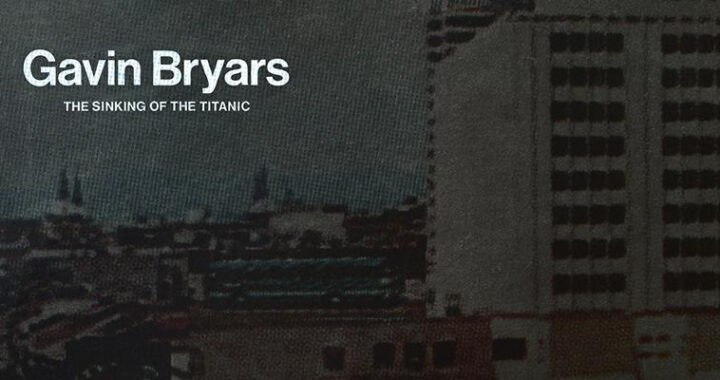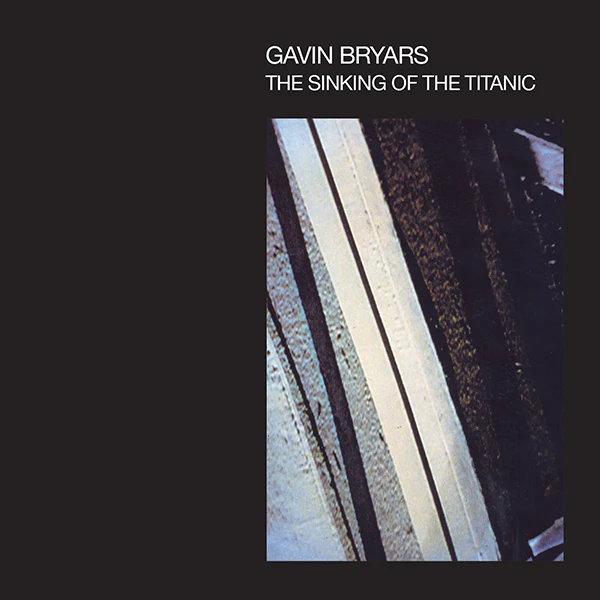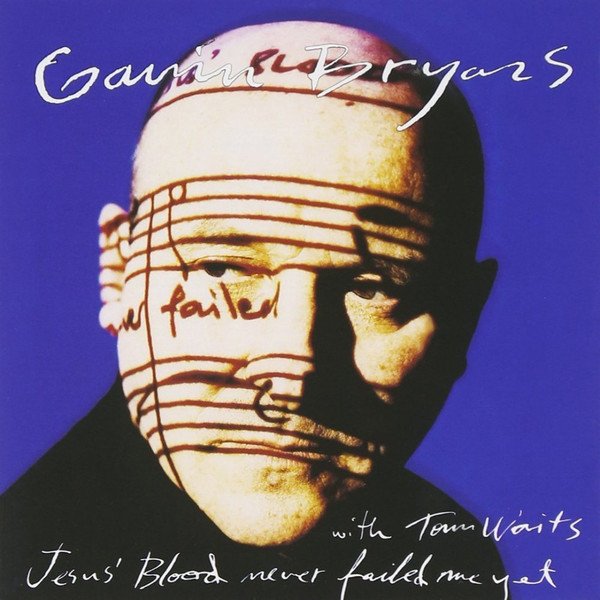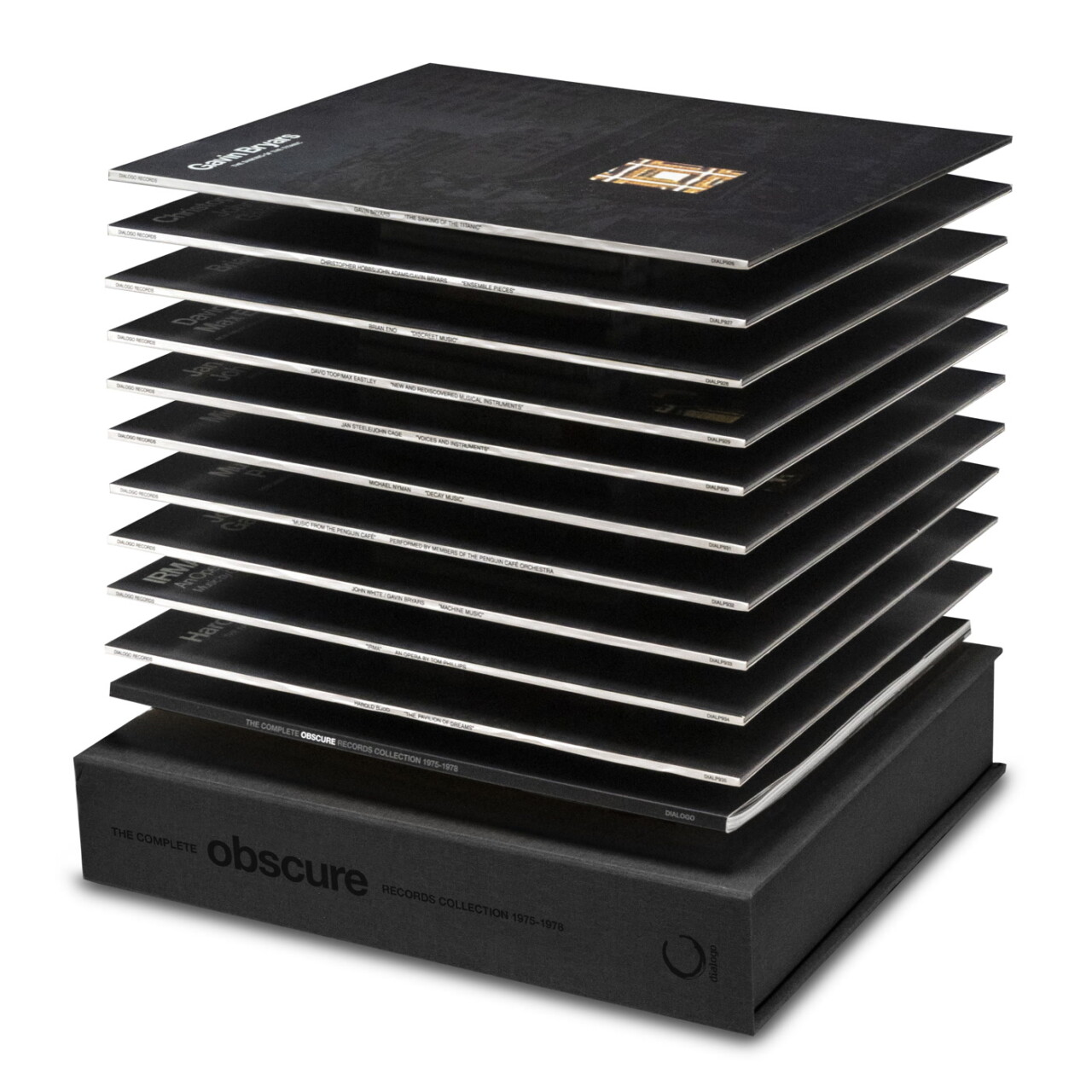The 1975 recording of his magnum opus The Sinking Of The Titanic for Brian Eno’s Obscure Records is reissued after almost half a century on CD and LP as part of The Complete Obscure Records Collection – 75/78, a unique box set containing the entire catalogue of Brian Eno’s influential label.
Gavin Bryars was born in Yorkshire, England. His first steps in music were as a jazz bassist in the early sixties with improvisers Derek Bailey and Tony Oxley. He collaborated with composers John Cage and Cornelius Cardew, with the Hilliard Ensemble and the Arditti Quartet. He founded the Portsmouth Sinfonia and teamed up with Brian Eno for his legendary Obscure label.
The Sinking Of The Titanic was Bryars’ first major composition. The piece is based on the anthem that, according to legend, the six string players of the luxury liner RMS Titanic continued to play as their ship, on its maiden voyage from Southampton to New York City, disappeared into the waves of the Atlantic Ocean on 15 April 1912, having struck an iceberg a few hours earlier. Of the 2,201 people on board, 711 survived the disaster. The musicians were not among them.
Produced by Brian Eno in 1975 as the first release for Obscure, The Sinking Of The Titanic immerses the listener in a mesmerising and deeply moving world of eerie beauty, tragic and deeply touching. In the way the piece unfolds – a constantly repeated theme with elements added and removed – the music refers in part to a theory by the Italian Guiglielmo Marconi (1874-1937), the inventor of wireless telegraphy. He argued that sounds, once created, never die, only get weaker and weaker until we can no longer hear them.
The album that launched Brian Eno’s Obscure label is now being reissued on vinyl for the first time in almost half a century by the American label Superior Viaduct.
Magnum Opus
Many consider The Sinking Of The Titanic to be one of the highlights of the modern classical music canon. It is Gavin Bryars’ magnum opus. But there’s more. Side two of the album contains an equally impressive composition. Jesus’ Blood Never Failed Me Yet is based on a tape recording made by an old London tramp in the early seventies. Collaborators include Derek Bailey, Michael Nyman and John White.
The method that Bryars had used in The Sinking Of The Titanic was applied here as well. Jesus’ Blood Never Failed Me Yet is a composition with a story. In 1971, when Bryars was living in London, a filmmaker friend, Alan Power, was making a documentary about the homeless in London near Elephant & Castle and Waterloo Station. The director asked Bryars if he could help with the film’s sound tapes. It was while working on these tapes that the composer first heard the voice that was to play such an important part in his musical life. During the filming, some tramps were singing bits of opera, a folk song, a sentimental tune. One of them, an old man, not drunk like the others, sang a religious song: Jesus’ Blood Never Failed Me Yet. His voice was as fragile as thin-blown glass, yet powerful in his faith in the God who would eventually take him into His loving arms: “There’s one thing I know, for He loves me so…” However, the section containing this song was cut from the film and ended up in the possession of Bryars, who was given all the unused tapes. When the composer later played the tape at home, he discovered that the old man’s singing somehow matched his own piano playing perfectly, especially the first part, which had an almost hypnotic effect. He made a loop of it, initially with the intention of using it in a Pop Art or Minimal Art production, but eventually found the material too complex and rich in its own way to be used “for something so simple”.
The story goes that while Bryars was working in the studio and went to the canteen for a cup of coffee or something, he left the door of the room where the tape was playing open and when he came back he was surprised to find that the atmosphere had changed. People were much quieter than usual, and some were crying softly, captivated by the voice of a tramp on a tape that was still playing, and the composer realised that he had something on his hands that he would have to handle very carefully.
To cut a long story short, Bryars orchestrated the work and a first version was released on an LP by Brian Eno’s Obscure Records in 1975. However, as it was intended for vinyl, the recording was on the short side. So the composer seized the opportunity to record a new Jesus’ Blood (now on CD) for Philip Glass’s Point Music label, with, among others, Tom Waits, whose voice joins that of the tramp at the end of the recording and lifts it up.
“He maintained that optimism, that simple belief, that life is fundamentally a good thing” – (Gavin Bryars on the unknown singer of Jesus’ Blood)
Consoling Power
In the opinion of many, Jesus Blood Never Failed Me Yet has a great power of consolation, which the old singer himself had never heard in the version by Bryars. Attempts were made to find out something about him during the first recording in 1975, but all inquiries came to nothing.
Bryars would have liked to share his royalties with the man, he said when I spoke to him about Jesus’ Blood in the early nineties, but unfortunately no one knew his name. Bryars: “It was clear during the filming that he had only a few months to live. He was well into his eighties and very weak from living on the streets. Nobody knew who he was. But suddenly, while we were doing the first shots, there he was. He was joking around with the film crew, playing a game where they exchanged hats. We know nothing about him, which in a way makes it all the more poignant. I would have liked to meet him. I would have liked to have had him in the studio for the first recordings, so that he could hear how his voice sounded with an orchestra in a way that he had never heard before”.
The composer was aware of the great emotional impact Jesus’ Blood had on people, but, he added, it was never his intention to create a piece with a preconceived plan to reach people on that level.
“In fact, I was trying to recapture and extend the feeling I myself had when I first heard that voice, which moved me deeply. I certainly did not want to distort that voice into something completely different. The voice had to remain the same, just in a different setting to take the melody to the next level. Out of respect for the voice, the music became what it is, not to make it an emotional piece. It became an emotional piece; I find it an emotional piece to listen to; others find it an emotional piece to listen to. I know a lot of people for whom the old Obscure record was very important, Tom Waits for example. When I first met Tom, he told me that he had lost his copy and he really wanted another one because it was his favourite record, because he had a particularly emotional experience with it once. I once worked for a while with a French film actress who is now dead, Delphine Seyrig. While I was working with her, her mother died. Her son, who had a copy of the record, kept playing this music, over and over again, for days on end, and for her, she said, it kept her going through the period of grief she was going through. It’s a very personal thing, and there’s no way I can consciously make it happen. I can’t sit down at my desk and come up with a piece that will free people from their worries. Ultimately, it’s a by-product of the voice of the man who sings on this record, a man who was very close to death and who sang that the blood of Jesus never failed him, whereas if there was anyone who was forsaken by Jesus, it was this man. But he kept that optimism, that simple faith that life is basically a good thing”.
Jesus’ Blood Never Failed Me Yet: music in harmony with the times, then and now.
“Jesus’ blood never failed me yet
Never failed me yet
Jesus’ blood never failed me yet
There’s one thing I know
For He loves me so…”
The Sinking Of The Titanic / Jesus’ Blood Never Failed Me Yet
Superior Viaduct | Konkurrent
![]()
Various Artists ‘The Complete Obscure Records Collection – 75/78’
Dialogo (via Soundohm)
The Complete Obscure Records Collection – 75/78 is a historic 10 LP and 10 CD box set featuring the complete output of Brian Eno’s influential Obscure Records label. Co-curated by Eno, Gavin Bryars and Michael Nyman, the collection includes debut recordings by Bryars, Nyman, John Adams, Christopher Hobbs, David Toop, Max Eastley, Jan Steele, Simon Jeffes/The Penguin Café Orchestra and Harold Budd, as well as key compositions by John Cage, Tom Phillips and John White – Obscure Records’ collective output is a major milestone in the history of minimalism, modern composition and experimental music, and laid the foundations for the rise of ambient music. Remastered with original artwork and liner notes, the box set offers a unique insight into the experimental music scene of the 1970s and the origins of ambient music.




